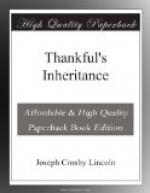Now all this was changed. No one seemed in a hurry, no one appeared to care what the time might be, and no one grumbled. Mr. Daniels was particularly affable and gracious; he even condescended to joke. He was wearing his best and newest suit and his tie was carefully arranged. Emily was in high spirits, laughed at the jokes, whether they were new or old, and seemed to be very happy. She had been for a walk along the bluff, and the sea breeze had crimsoned her cheeks and blown her hair about. She apologized for the disarrangement of the hair, but even Miss Timpson—her own tresses as smooth as the back of a haircloth sofa—declared the effect to be “real becomin’.” Heman Daniels, who, being a bachelor, was reported to be very particular in such matters, heartily concurred in this statement. Mr. Hammond said it reminded him some of Laviny Marthy’s hair. “Laviny Marthy was my wife that was,” he added, by way of explanation. John Kendrick said very little; in fact, he was noticeably silent during dinner. Miss Timpson said afterward: “That Mr. Kendrick isn’t much of a talker, is he? I guess he’s what they call a good listener, for he seemed to be real interested, especially when Miss Howes was talkin’. He’d look at her and look at her, and time and time again I thought he was goin’ to say somethin’, but he didn’t.”
He was not talkative when alone with Captain Obed that afternoon. They paid one more visit to the building “opposite the postoffice” and while there he asked a few questions concerning the rent. The figure named by the captain was a low one and John seemed to think it too low. “I’m not asking charity,” he declared. “At least you might charge me enough to pay for the paint I may rub off when I open the door.”
But Captain Obed obstinately refused to raise his figure. “I’ve charged enough to risk what paint there is,” he announced. “If I charged more I’d feel as if I had to paint fresh, and I don’t want to do that. What’s the matter with you, John? Want to heave your money away, do you? Better keep the odd change to buy cigars. You can heave them away, if you want to—and you won’t be liable to hit many lawyers neither.”
At supper time as they stood by the gate of the High Cliff House the captain, who was to eat at his regular boarding-place, the Parkers’, that evening, ventured to ask the question he had been so anxious to ask.
“Well, John?” he began.
“Well, Captain?”
“Have you—have you made up your mind yet?”
Kendrick turned over, with his foot, a stone in the path.
“I—” he paused and turned the stone back again. Then he drew a long breath. “I must make it up,” he said, “and I can do it as well now as a week later, I suppose. Wherever I go there will be a risk, a big risk. Captain Bangs, I’ll take that risk here. If you are willing to let me have that office of yours for six months at the figure you have named—and I think you are crazy to do it—I will send for my trunk and my furniture and begin to—look out of the window.”




